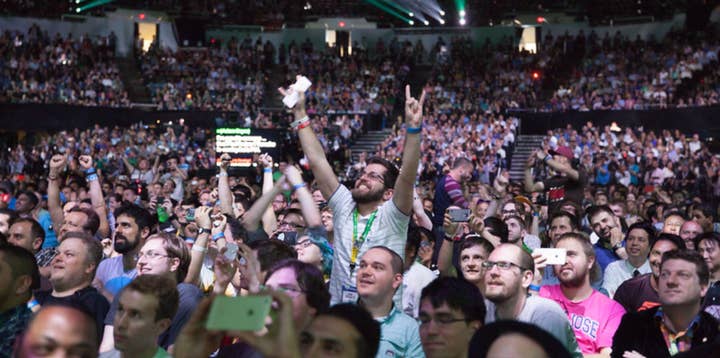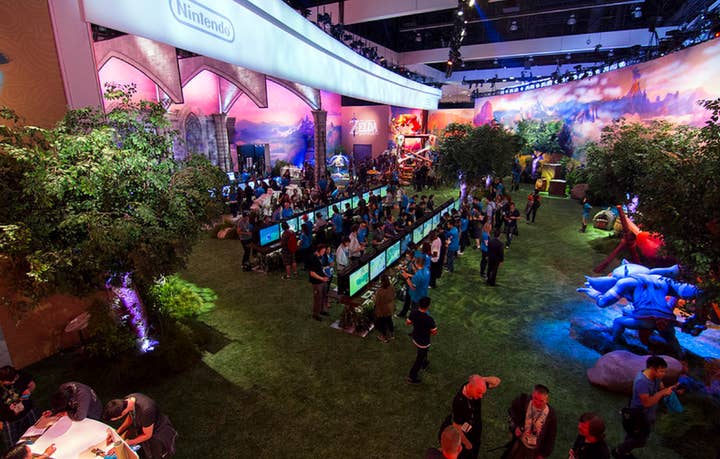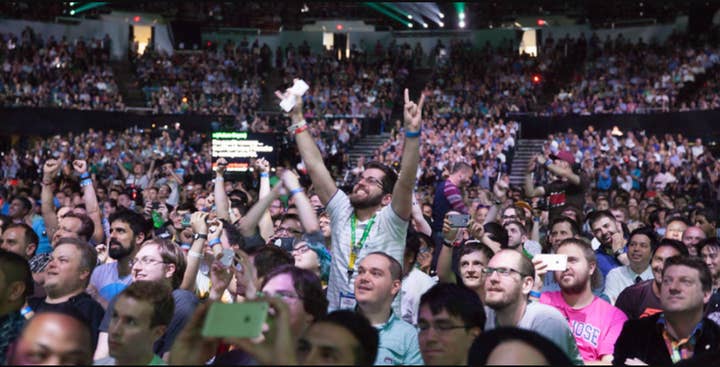E3 and the death of shock reveals | Opinion
Publishers will need to go deeper to deliver the surprises
Seven years ago I was sitting at a bloggers table during PlayStation's pre-E3 press conference.
(I wasn't a blogger, but by calling myself one I got a table and good wifi, I'm not sure why).
To jog your memory of this conference, it was the one where Sony re-announced The Last Guardian, the Shenmue 3 Kickstarter was revealed, and Square Enix stunned audiences with a teaser for Final Fantasy 7 Remake.
It was PlayStation at the peak of its popularity. It had staged quite the comeback with PS4 18 months earlier, and this showcase cemented it. The roar that greeted each announcement was deafening. When the Final Fantasy game was revealed, the guy sitting next to me kicked back his chair, fell to his knees and screamed "Oh My God, Oh My God". The church of PlayStation was rocking that day.
On a personal level, I didn't have much connection to any of those announcements, but the excitement was infectious. Share prices rose afterwards and PlayStation was the talk of Los Angeles.
On reflection, however, it was all a bit of fluff. The games existed on paper, but neither Shenmue 3 or the Final Fantasy VII Remake had entered full production. The former hadn't even been funded yet, and the latter was just a trailer put together by the animation team. Both games would take nearly five years before they were released.

Since that day, I've experienced fewer genuine E3 surprises. They've happened, of course, but they're rarer and trickier to keep under wraps. AAA games are taking longer to make and require more people to make them, and keeping them a secret is harder as a result.
And increasingly games companies are announcing their projects earlier in a bid to attract talent. Games like Wolverine or Fable or Splinter Cell were (at the time) nowhere near ready to be shown, but they were being worked on, the company was sending out recruiters to find talent to help make them, so why not just announce them? Some of these are announced to much fanfare at showcases, but others are simply consigned to a press release or social media post. It's hard to whip up excitement when players know that the game being teased is years and years away from release.
Outside of these early teases, games publishers are broadly more wary of showing too much too soon. Lessons have been learnt industry-wide from the likes of Cyberpunk 2077, where expectations were set too high. Reducing the time between announce and release is one way to avoid being accused of misleading customers. Look at last week's PlayStation State of Play, which featured games that are all due over the next 12 months. But as a result, we pretty much knew about all of them.
"We often equate E3 to Christmas, and just like Christmas, most of the presents have been tucked away come Boxing Day"
One game that hadn't been pre-announced ahead of Sony's event, but had been leaked, was the remake of Resident Evil 4. The original was one of my favourite games, and such a reveal should have excited me. I may not have kicked back my chair and invoked a diety, but I'd have nodded approvingly (which is the British equivalent). But I knew it was coming, so it wasn't the moment it could have been.
However, the announcement that something exists isn't the only way to get attention. Capcom still had a chance to surprise me with the game itself.
In fact, once the dust settles on events like E3, the things that were teased often get pushed to the back of the mind, and what's real and tangible is what dominates the conversation. We often equate E3 to Christmas, and just like Christmas, most of the presents have been tucked away come Boxing Day.
I think back to another memorable E3 moment for me, it was the following year in 2016, when Nintendo turned up to the show with one game. As a fan, I was disappointed. I wasn't getting my usual number of Christmas presents from Nintendo this year. I remember chatting to a GameSpot journalist at a mixer before E3 who was equally critical and felt Nintendo shouldn't have bothered at all.

But what a present it was. The Legend of Zelda: Breath of the Wild was a showstopper. Nintendo took us deep into the game, journalists got to explore the world freely, and even the queue around the booth grabbed headlines. We knew the game existed, we knew the broad pitch, but Nintendo still managed to surprise.
It was also real. This wasn't a teaser trailer made by a creative agency to announce something that's five years away.
I think to how the movie and TV industry hypes up its audiences, and the moment that gets the most excitement is not the news of something entering production, but it's the Comic-Con sneak peak, the trailer reveal, the casting news and the story teases.
As the industry evolves, we should expect showcases like E3 to become more like this. An event with fewer reveals, and more in-depth looks at something you probably already knew about. An event that's less about logos, and more about the games underneath. And I think that will make for a better show.

